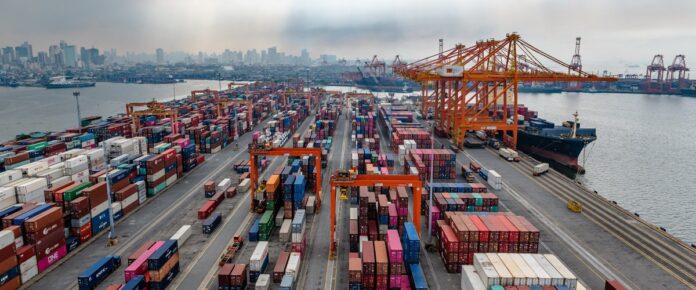-
International Container Terminal Services, Inc.’s attributable net income for 2020 rose 1% from 2019
-
Revenues from port operations were 2% higher than in 2019
-
ICTSI handled 10.193 million twenty-foot equivalent units in 2020, slightly higher than the 10.178 million TEUs handled in 2019
-
Capex budget for 2021 is $250 million, to complete expansion projects, acquire and upgrade equipment and conduct various maintenance requirements
International Container Terminal Services, Inc. (ICTSI) reported a net income attributable to equity holders of US$101.8 million for 2020, 1% higher than the $100.4 million earned in 2019.
Revenues from port operations reached $1.505 billion, 2% higher compared to the $1.481 billion reported in 2019.
ICTSI, in a statement, said the increase is due to the contribution of ICTSI Rio; higher revenues from ancillary services; tariff adjustments and new services at certain terminals; and favorable translation impact mainly from Philippine peso-based revenues in Philippine terminals.
The result was partially tempered by the decline in trade activities, mainly as a result of the lockdown restrictions imposed by most governments to contain COVID-19 infections.
“ICTSI has delivered a positive performance in very challenging circumstances and it highlights not only the significant dedication and commitment of our colleagues who have performed strongly throughout the pandemic but also the agility and strength of our business,” ICTSI chairman and president Enrique K. Razon, Jr. said.
“We were swift to take action at the start of the pandemic to initiate cost reduction, reduce capital expenditures, and later seized opportunities to lengthen our debt maturities at lower rates,” Razon noted.
He added that ICTSI has stepped up its social community support and increased health and safety measures at all ports “to ensure that we all remain resilient in these extraordinary times.”
He further explained: “These actions have helped us to navigate a severe weakening of demand at some of our key terminals around the world. And as our volumes rebounded from their lows when lockdown restrictions began to lift in the second half, so did our margins reflect the benefits of these actions. Those gains have continued into the new financial year as ICTSI emerges from these trying times leaner, stronger and optimistic of the future as governments around the world begin the herculean task of global mass vaccination.”
ICTSI handled a consolidated volume of 10.193 million twenty-foot equivalent units (TEUs) in 2020, marginally higher by 0.2% compared to the 10.178 million TEUs handled in 2019.
The increase was due to the contribution of ICTSI Rio, the company’s new terminal operations in Rio de Janeiro in Brazil; improvement in trade activities in the second half of 2020 as lockdown restrictions in most parts of the world eased; and new contracts with shipping lines and services at certain terminals.
Growth was tempered, however, by the decline in trade activities mainly in the first half of 2020, which resulted from lockdown restrictions and the impact of COVID-19 pandemic on global trade.
Capital expenditures (capex) in 2020 amounted to $198.7 million, exceeding the reduced capex budget of $160 million for the year, mainly due to the additional capex from the new terminal in Kribi, Cameroon, and the reinstitution of postponed capex in a number of terminals, which demonstrated strong volume growth in the second half of 2020.
The group’s capex budget for 2021 is approximately $250 million, which will be utilized for the completion of the expansion project at Manila International Container Terminal; the ongoing yard expansion at ICTSI DR Congo in Matadi, Democratic Republic of Congo; the new expansion project at Victoria International Container Terminal in Melbourne, Australia; equipment acquisitions and upgrades; and various maintenance requirements.
ICTSI is currently involved in 32 terminal operations, including concessions and port development projects, in 19 countries worldwide.





